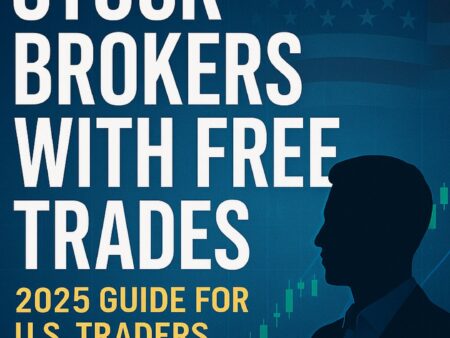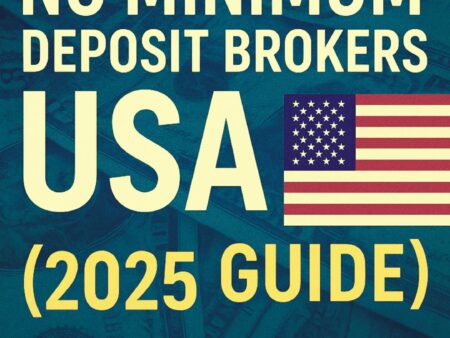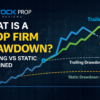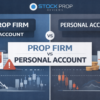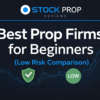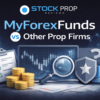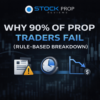Long-term investing is a proven strategy for building wealth over time. Whether you’re saving for retirement, funding a child’s education, or simply aiming to grow your net worth, the right stock broker can make all the difference. In the USA, investors have access to a wide range of brokers that offer competitive fees, robust research tools, and reliable trading platforms.
In this guide, we’ll break down the best brokers for long-term investing in the USA, highlight their features, compare pricing, and help you choose the one that fits your needs. We’ll also touch on TradeThePool — a stock prop firm option for traders who want to start trading without large capital.
Why Choosing the Right Broker Matters
When you’re investing for the long term, small differences in fees, account features, and available investment products can significantly impact your returns. The best broker for you should offer:
- Low or no commission fees on stocks and ETFs
- Strong research tools for investment analysis
- Retirement and tax-advantaged account options (IRA, Roth IRA)
- Reliable customer support
- Easy-to-use mobile and desktop platforms
Top Factors to Consider for Long-Term Investing
1. Account Fees & Commissions
- Look for low commission brokers — most now offer $0 stock and ETF trades.
- Check expense ratios for mutual funds and ETFs.
2. Investment Products
- Access to a wide range of stocks, ETFs, mutual funds, and bonds.
- Availability of fractional shares for diversification with small amounts.
3. Platform & Tools
- User-friendly interface for beginners
- Advanced tools for intermediate investors
4. Account Types
- Individual brokerage accounts
- Retirement accounts like 401(k) rollovers, IRA, Roth IRA
5. Research & Education
- High-quality research reports
- Webinars and courses for trading for beginners
Best Brokers for Long-Term Investing (2025)
| Broker | Best For | Stock/ETF Commissions | Account Minimum | Notable Features |
|---|---|---|---|---|
| Fidelity | Retirement investing | $0 | $0 | Industry-leading research, zero expense ratio index funds |
| Charles Schwab | Beginner-friendly investing | $0 | $0 | Fractional shares, strong customer service |
| Vanguard | Low-cost index funds | $0 | $0 | Best for buy-and-hold investors, large ETF selection |
| E*TRADE | Active long-term investors | $0 | $0 | Powerful trading tools, managed portfolios |
| Merrill Edge | Bank of America customers | $0 | $0 | Preferred Rewards benefits, strong research tools |
Broker Overviews
1. Fidelity Investments
Pros:
- No commissions on stocks/ETFs
- Zero expense ratio index funds
- Excellent retirement planning tools
Cons:
- Bond fees can be higher than competitors
User Experience: Fidelity is known for exceptional customer support, robust research tools, and a great mobile app. Perfect for long-term, low-cost investing.
2. Charles Schwab
Pros:
- $0 stock and ETF trades
- Access to fractional shares
- Excellent educational resources
Cons:
- Limited international trading options
User Experience: Schwab’s platform is intuitive for beginners but powerful enough for experienced investors. Great for building a diversified portfolio over time.
3. Vanguard
Pros:
- Leader in low-cost index funds
- Focus on long-term wealth building
- Strong reputation for investor-first principles
Cons:
- Website interface is less modern
User Experience: Vanguard is ideal for buy-and-hold investors focused on low fees and passive investing strategies.
4. E*TRADE
Pros:
- Powerful trading tools
- Commission-free stocks and ETFs
- Managed portfolios available
Cons:
- Platform may be overwhelming for beginners
User Experience: E*TRADE offers a strong mix of research tools and investment products, making it great for intermediate long-term investors.
5. Merrill Edge
Pros:
- Strong integration with Bank of America accounts
- Excellent research and reports
- Preferred Rewards program benefits
Cons:
- Limited no-transaction-fee mutual funds compared to Fidelity
User Experience: Perfect for Bank of America clients who want seamless integration between banking and investing.
Long-Term Investing Fee Comparison
| Broker | Stock/ETF Commission | Mutual Fund Fees | IRA Fees |
| Fidelity | $0 | Many $0 transaction fee funds | $0 |
| Schwab | $0 | Many $0 transaction fee funds | $0 |
| Vanguard | $0 | Many $0 transaction fee funds | $0 |
| E*TRADE | $0 | Many $0 transaction fee funds | $0 |
| Merrill Edge | $0 | Many $0 transaction fee funds | $0 |
Why Long-Term Investors Should Consider Prop Firms Too
While this guide focuses on long-term investing, many traders also explore short-term opportunities. Prop firms help you get funded to trade remotely without using your own large deposit.
Many traders are also exploring TradeThePool stock prop firm in 2025 — these stock prop firms fund traders, so you can trade with little or no deposit. This model is appealing for those who want to actively trade while keeping their long-term investments intact.
FAQ – Best Brokers for Long-Term Investing
1. What’s the best broker for retirement investing?
- Fidelity and Vanguard are top choices for retirement accounts due to their low fees and excellent investment options.
2. Are discount brokers good for long-term investing?
- Yes. Many low commission brokers now offer free trades, making them ideal for building long-term portfolios.
3. Do I need a lot of money to start long-term investing?
- No. Many brokers allow you to start with $0 account minimum and even offer fractional shares.
4. Can I invest in mutual funds and ETFs through these brokers?
- Yes. All brokers listed provide access to mutual funds, ETFs, and other long-term investment products.
5. What’s the difference between a stock broker and a prop firm?
- A stock broker helps you invest your own money. A prop firm funds you to trade their capital.
6. Is TradeThePool good for beginners?
- Yes, especially for those who want to trade actively without committing large amounts of personal capital.
Conclusion
Choosing the best brokers for long-term investing depends on your goals, preferred investment products, and comfort with platform tools. Fidelity, Schwab, Vanguard, E*TRADE, and Merrill Edge all provide excellent options for trading for beginners and experienced investors alike.
Want to start trading without using your own money? Explore the top-rated stock prop firm TradeThePool.
